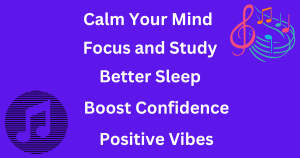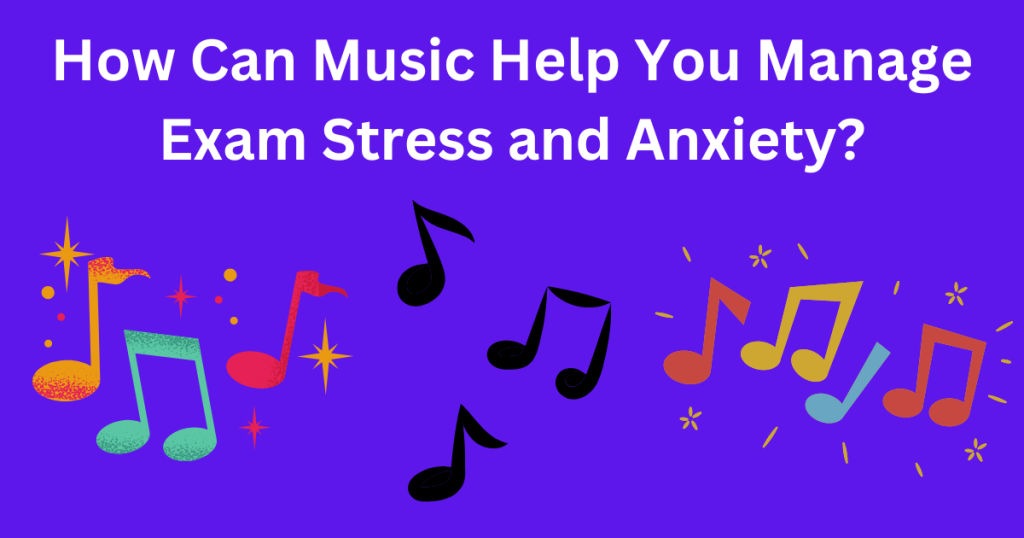Yes, it is True. Music can helps you to Manage your Stress during Exams. How Can Music Help You Manage Exam Stress and Anxiety?

Absolutely, music can indeed help you effectively manage the overwhelming stress and anxiety that often accompany exams. The soothing power of music has the remarkable ability to create a harmonious balance within your mind, significantly alleviating the strains associated with academic pressures.
By immersing yourself in calming melodies and gentle rhythms, you can trigger a relaxation response that counteracts the stress response. This helps in reducing the heart rate, easing muscle tension, and promoting an overall sense of tranquility. Additionally, music has the potential to stimulate the release of dopamine, a neurotransmitter linked to pleasure and positive emotions. This infusion of positivity can act as a potent antidote against the anxiety that exams might bring. Many peoples in the whole world listen to Music that Helps You Manage Exam Stress and Anxiety.
Integrating music into your study routine can offer a therapeutic escape from the intensity of exam preparation. Listening to music while studying can help in maintaining focus and enhancing concentration. It also serves as a valuable tool during breaks, helping to clear your mind and recharge your mental faculties.
Furthermore, the rhythmic patterns and comforting harmonies of music can aid in developing a sense of structure and routine, which is essential for managing stress. Crafting playlists that resonate with your personal preferences can create a calming oasis where you can seek solace amidst the academic storm.
Ultimately, music offers a versatile and accessible strategy to mitigate the adverse effects of exam-related stress and anxiety. As you immerse yourself in its melodies, you empower yourself with a simple yet potent tool that can transform your exam experience from one of trepidation to one of composed confidence.
Using music as a tool to manage exam stress and anxiety can be simple yet powerful. Here’s how Music Help You Manage Exam Stress and Anxiety:
Music Help You Manage Exam Stress and Anxiety
- Calm Your Mind: Listening to soothing music can calm your thoughts and relax your mind.
- Lower Stress Hormones: The right music can reduce stress hormones in your body, helping you feel less tense.
- Positive Feelings: Music can trigger happy feelings by releasing chemicals that boost your mood.
- Slow Down: Slow-tempo music can slow down your heart rate, making you feel more peaceful.
- Focus and Study: Soft music in the background while studying can help you concentrate better.
- Create a Routine: Listening to calming music regularly can create a calming routine that your body recognizes.
- Better Sleep: Gentle melodies before sleep can improve your sleep quality, which is vital for managing stress.
- Relieve Worries: Music can distract you from worrying thoughts, giving your mind a break.
- Mindfulness Aid: Paying attention to music is a form of mindfulness, which reduces stress.
- Positive Associations: Certain songs can remind you of good times, helping you feel happier.
- Comfort Zone: Listening to favorite tunes can make you feel more comfortable and at ease.
- Short Breaks: Take short breaks with calming music to recharge during study sessions.
- Relaxation Techniques: Use music along with relaxation exercises like deep breathing.
- Soothing Sounds: Natural sounds in music, like rain or ocean waves, can be very soothing.
- Express Emotions: Music can help you express emotions you might find hard to put into words.
- Reduce Physical Tension: Relaxing music can ease muscle tension, making you feel less stressed physically.
- Positive Vibes: Upbeat music can make you feel more positive and confident.
- Escape from Stress: Music creates a temporary escape from stressors, giving your mind a rest.
- Connect with Others: Sharing music with friends who also feel stressed can help you bond and cope together.
- Personal Space: Use music to create a calming space wherever you are, whether at home or outside.
- Emotional Release: Music can provide a healthy outlet for your emotions, helping you release built-up tension and anxiety.
- Positive Distraction: Engaging with music can shift your focus away from anxious thoughts, allowing you to experience a mental break.
- Boost Confidence: Listening to empowering music can boost your self-confidence and motivate you to face challenges with a positive mindset.
- Memory Enhancement: Certain types of music can improve memory retention, aiding in studying and recalling information during exams.
- Create a Study Playlist: Curate a playlist of calming songs that you listen to while studying, creating an association between focused learning and relaxation.
- Aid Concentration: Instrumental music without lyrics can enhance your ability to concentrate, keeping distractions at bay.
- Improve Productivity: Music with a steady tempo can help maintain a consistent pace while studying, improving overall productivity.
- Visualization Tool: Listen to music that evokes imagery of calm environments, helping you mentally escape stress and imagine peaceful places.
- Stress-Free Commute: Play relaxing music during your commute to and from exam venues, setting a serene tone for the day.
- Reduce Physical Symptoms: Calming music can alleviate physical symptoms of stress like rapid heartbeat or shallow breathing.
- Customize Your Experience: Experiment with different genres and styles to find what resonates with you, as individual preferences vary.
- Enhance Relaxation Techniques: Combining music with techniques like meditation or progressive muscle relaxation can intensify their effects.
- Synchronize Breathing: Choose music with a rhythm that matches your breathing, aiding in relaxation and stress reduction.
- Create a Ritual: Establish a calming routine by listening to music before starting your study sessions or just before sleeping.
- Transition to Rest: Wind down after a study session by playing gentle music, signaling your body to relax and transition into rest mode.
- Express Individuality: Music choices can be a reflection of your personality, giving you a sense of control during stressful times.
- Escape to Creativity: Engaging with music can activate the creative areas of your brain, offering an escape from analytical thinking.
- Enhance Visualization: Listen to music while visualizing your successful performance during exams, reinforcing positive outcomes.
- Evoke Nostalgia: Familiar songs from the past can evoke nostalgia and comfort, reducing anxiety through positive memories.
- Incorporate Rhythms: Incorporate rhythm into your relaxation techniques, using music to guide your breath or movement.
Above are the 40 points of How Music Help You Manage Exam Stress and Anxiety. You can listen good music or even Religious music that helps you Manage Exam Stress and Anxiety.
Remember, music is a versatile tool that can be tailored to suit your preferences and needs. Whether you’re listening to ease pre-exam jitters, enhance focus during study sessions, or wind down after a busy day, music can provide valuable support in managing stress and anxiety.



